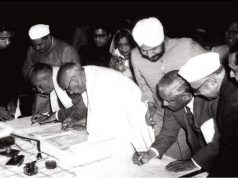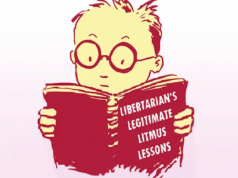The law perverted! And the police powers of the state perverted along with it! The law, I say, is not only turned from its proper purpose but is made to follow a totally contrary purpose! The law is becoming the weapon of every kind of greed! Instead of checking crime, the law itself is guilty of the very crimes it is supposed to punish! If this is true, it is a serious matter and moral duty requires of me to call the attention of my fellow citizens to it.
FRÉDÉRIC BASTIAT
The Law As a former Deputy Commissioner of Police, let me begin by asserting that a ‘rule of law society’ is not very difficult to achieve. It certainly does not require, as many morons believe, a military dictatorship. London, Frankfurt, Amsterdam… there is order in these cities not because of the police, but because of the people.
All that societal order requires is good law – which all the people understand, and which all the people respect and follow, knowing well that it is in their interest to do so. Of course, judges and lawyers should be extremely well versed in these principles, and uphold them in their judgements and arguments. What are these principles?
PRIVATE SEVERAL PROPERTY
We are born with faculties which we exercise on the resources of the Earth to produce Property. The first nomad who cleared the forest and settled down in agriculture created Property. The chef who produces a meal at a restaurant produces Property – and we cannot consume the meal legally without paying something in exchange: the price. Private several property is basic to the morality of the market – indeed, it is basic to all human morality.
Property existed before formal law was made; indeed, formal law was made because there was property. When delivering the Ten Commandments, the Prophet Moses thundered “Thou shalt not steal”. Without an understanding and respect for what’s ‘mine’ and what’s ‘not mine’ no trade can take place. The market cannot work if it is legal or moral to steal. If too many thieves come to the bazaar, the shopkeepers have no option but to take their business elsewhere.
The notion of private several property goes even deeper into human morality than market exchange: it goes into the very way we breed; it goes into the most important of human institutions – the family. A woman puts sindoor on her head to indicate to all that she belongs to someone, and is not ‘free’. A man wears a wedding band for the same reason. And all the people respect this: otherwise human society would break down. It is not breaking down not because some dictator is imposing the Law, but because everybody understands, respects and follows these basic rules of a rule of law society. The Prophet Moses also thundered “Thou shalt not covet another man’s wife.” In the Ramayana, the villain Ravana is reviled because he has violated this most sacred of principles: he has run off with another man’s wife. Hinduism, Islam, Christianity… indeed, all faiths, respect private several property.
Socialists do not. The Constitution of India is the longest written Constitution in the world – which means we Indians must have desired justice. But this enormously long Constitution does not guarantee private property rights! Thus, Indira Gandhi could nationalise private banks, she could nationalise the coal mines, Air India… what have you. The law allowed it. The law did not say that the airline belonged to JRD Tata and the State has to protect Property, not take it away.
Socialist law is ‘legal plunder’ – to use Bastiat’s immortal words. And it is not just nationalisation. There is legislation on issues such as ‘land redistribution’: which means that the Law will steal land from those who have it and give it to those who don’t. There are rent control laws by which tenants can take over the landlord’s property. These immoral laws promote crime. There are private armies in Bihar because the law is perverse. There are underground dons involved in tenancy disputes because of the law. Slumlords happen because the law does not approve of landlords and landladies. Indeed, priceless urban properties are destroyed because landlords can no longer afford their upkeep.
Private several property is vital if the environment is to be looked after and natural resources managed such that there is always abundance. Chickens, goats, pigs and cattle survive because they are private several property: someone owns them. Endangered species would survive too if we could farm them. The wilderness can also be privatised and protected as the personal property of those who value wilderness.
On the management of natural resources, consider the curious fact that there is no shortage of petrol or diesel in the world, although the Earth possesses very little oil. And there is a shortage of water despite the fact that the Earth is made seven parts of water! This is because the State owns all the water; while in the case of oil there is a market working and underground oil fields are private several property: you can own an underground oil field. When the state owns all the water, there are bound to be shortages. As Milton Friedman famously remarked, “If you give the Sahara Desert to the government, there will be a shortage of sand in 5 years!”
Picture the town of Dehra Doon, which lies between the Ganga and the Yamuna – north India’s mightiest rivers. There is a water shortage in Dehra Doon. To find out why not visit Dakpathar, 40 km from Dehra Doon on the banks of the Yamuna. Here the state is damming river water and despatching it free to Punjab farmers who use it to grow rice (which requires 21 waterings). The town of Dakpathar is a ghost town amidst beautiful landscape because the irrigation department, which owns the town, is broke, and is making no profits from the water. In the case of the Narmada Dam, everyone says the tribals must be compensated for their land which was inundated; no one says they should be compensated for the river water, over which they must possess shared property rights because they have been living next to the river for millennia.
If property rights were established over river water, the Narmada and the Cauvery issues could be settled without politics. And with justice. Now, the Law is being employed to force the issue, and this backfires as, for example, when the Karnataka chief minister refused to comply by the Supreme Court’s directives. With property rights applied uniformly as a principle, the law is easy to enforce. Everyone follows the law. And there is abundance of all resources.
Some consider intellectual property rights like patents to be essential. I do not believe in temporary monopolies granted by the state. If without them, all innovation would cease, we wouldn’t be flooded with recipe books! Or with new fashions. Those who are asking for patents are simply saying: I have a great idea that can make money only if the State grants me a temporary monopoly. Why doesn’t every fashion designer or recipe book author say the same thing? What is required is copyright protection – not patents. And for drug companies: if we apply torts (see below) they would not need to go through expensive regulatory bottlenecks like the US Food and Drug Authority (FDA). Without the FDA, new drugs would be cheaper to deliver to the market and, in case there are errors and consumers are harmed, tort laws can yield suitable compensation.
Even when enforcing copyright protection, judges should be careful to see whether there is mens rea and genuine fraud. For example, someone who sells a Rolex for 300 rupees is not trying to pass it off as a genuine article: he is selling it as a ‘duplicate’ that is cheap and not covered by any guarantee. The consumer should be free to buy this ‘duplicate’. And if Rolex watches can be copied for so little, the company better wake up and improve its product. Think: if we want to really enforce copyright protection blindly, we would probably have to bomb Ulhasnagar. I have never been there but am told that the entire town specialises in making duplicates. We would also have the police searching all our houses for music CDs we have ‘burned’ from our friends.
We form collectives like the state for one reason only: to protect ourselves and our properties better. We do not have the power to take other’s properties away. So, when we get together to make the Law, this law too cannot have the power to take anyone’s property away. The basic purpose of Law is the protection of property. Since the socialist Constitution of India does not recognise property rights, Indians must press for a Second Republic, for this socialist constitution is an immoral document.
Liberal jurisprudence, based on private several property, can also solve some pressing problems that the Hindutva brigade has thrust upon us. If they have their way, Parliament will soon pass a law banning cow slaughter – and I will be denied my steak. A liberal Supreme Court would tear up any such law on the grounds that cows are private property and the State cannot interfere. Everyone must be free to do what he wants with his own cow: free to either worship it or eat it. *
Similarly, the ‘disputed site’ at Ayodhya. To ‘de-politicise’ matters, the issue was referred to the Supreme Court. What did this socialist court do? They asked the Archaeological Survey of India to dig up the disputed site and discover what lay underneath. Is this the application of our principle? If a temple to the Goddess Piripiri of the Bhotcharge tribe is discovered under my house, can a latter-day Bhotcharge lay claim to my property? Certainly not! If liberal jurisprudence is applied to Ayodhya the solution is clear and simple: there is no clear title to the site; there are various claimants, each possessed of little legitimacy; therefore the site must be auctioned. We could auction it off in little lots – one auction every year – and in this way keep religious fanatics out of politics, busy collecting money all their lives.
Socialist jurisprudence is not justice. Socialists reject the natural law of property and believe that the purpose of the law (and the State) is to redistribute property. Theirs is a Robin Hood ideology – but it is time we stopped looking at their ‘legal plunder’ (what they call ‘redistributive justice’) as romantic.
CONTRACTS
The second feature of Law is that it must enforce contracts that are freely entered into by the people. That is, all the people are free, and, as free people, they will naturally enter into contracts with each other – say, a labour contract, a rental contract, a contract to repay a loan or a contract to use a telephone or electricity service. The Law must enforce these contracts when anyone violates them. The Law cannot dictate the terms of the contract.
But that is precisely what socialist law does. For example, I freely enter into a labour contract with a migrant worker – but the labour inspector will put me in jail and the labour laws will declare the contract invalid if I do not pay ‘minimum wages’. The socialist law will declare the contract voluntarily entered into by two free people null and void – because legislators want to dictate terms. They should not have this power. This is not the purpose of the Law.
Consider the damage done by minimum wages: the minimum wage is bound to be higher than the market clearing wage – or what’s the point. Now, as any simple demand and supply diagram will tell you, if you set a price by force which is higher than the market clearing price, less of the good will be demanded. Thus, in this case, less labour will be demanded. Further, when laying off workers, firms will retain their best people, and lay off the weakest workers – like the trainee or the apprentice. Firms might also be able to use prejudice when laying off workers – firing the Blacks or the Muslims or the lower castes. Firms will also have the incentive to use more machines, as they will become relatively cheaper. The purpose of minimum wages is to benefit the weakest worker, he who cannot legitimately earn that wage; the effect of minimum wages is to hurt the weakest workers. The apprentice or the trainee gets thrown out, or employed illegally, without any employee protection whatsoever. This is a classic case of the Law of Unintended Consequences: Nothing Causes More Harm Than Good Intentions!
Similarly with rent control law: free contracts between landlords and tenants are declared null and void if they are not on the side of the tenant. This takes away the incentive for landlords to build property and let them out to poor people who, of course, cannot afford to buy property. These poor people now have no choice but to go to the politically sponsored slumlord. The law was intended to benefit tenants; yet it hurts poor tenants most.
A third example of the non-enforcement of contracts concerns bankruptcy law. As we saw in the case of Rembrandt’s house in Amsterdam, it was bankruptcy law – the enforcement of a contract between a creditor and a debtor – that allowed the housing finance market to flourish. In India, till recently they did not care if people defaulted on their loans. The legislators did not care because they were running the banks as public property and were willfully allowing their friends to loot these banks. Thus, in India, there is still not a vibrant market for mortgage finance. This cannot happen so long as the debtor 436 can walk off with the financier’s money. People will not lend for housing as long as the loan contract is not enforced by the Law.
A fourth example of non-enforcement of contracts concerns the Indian rupee, on which the governor of the central bank ‘promises to pay the bearer a sum of X rupees’. When the governor cannot convert his note into money – be it gold, dollars or yen – it is the central banker who should be in prison: a debtor’s prison. The Foreign Exchange Regulation Act (FERA) is immoral legislation.
TORTS
If you go to McDonald’s at a time when the floor is being cleaned, you will always find a sign saying: Caution! Wet Floor. This is a standard practice in McDonald’s worldwide. However, if you go into any Indian restaurant when the floor is being cleaned, you will not find this sign. Why is this so?
This is because there is tort law in America. If you slip and fall and break your leg in a McDonald’s in America (and the floor is wet), you will get very rich very soon if the sign had not been there. You will not even have to find a lawyer: the lawyer will find you and take up the case free so long as he gets a share in the spoils.
Tort laws are a pillar of a rule of law society. It is always possible that people will be negligent. The right thing in such circumstances is to apply tort law and compensate the victim. In torts, the case is decided ‘on the preponderance of evidence’. In criminal law it is decided ‘beyond any reasonable doubt’. Thus, criminal cases are difficult to decide while tort cases are relatively simpler. This also makes sound economic sense, as David Friedman has pointed out: society faces a net loss when someone is imprisoned or executed, so these cases should be decided very carefully; society does not lose in tort cases as there is a simple transfer of resources, and so these cases should be decided fast. Torts are based on a higher jurisprudence: that of ‘restitution’: the negligent one restores the damage caused to the victim.
Criminal law is based on the doctrine of ‘retribution’: that you suffer for your sins. The doctrine of retribution is an older and less sophisticated jurisprudence. Further, criminal law is more concerned with ‘crimes against the state’ – with ‘public prosecutors’ and ‘public police’ and ‘public jails’; on the other hand, tort law recognizes the fact that crimes are always against individuals, and these individuals must be compensated by those who have committed these crimes.
Once, a colleague lost a lighter of mine, which he had borrowed. I offered him either retribution or restitution – either we cut off an arm or he restores to me a new lighter. He willingly chose restitution, and I now have a replacement lighter.
The advantages of having tort laws are various. Consider, say, the Gujarat earthquake. Many badly constructed buildings fell down. The newspapers reported of corruption among builders and their collusion with the authorities in charge of passing buildings. The urban development minister proposed registration of builders in Delhi and stronger building bye-laws. Will these work? Of course not!
Now think of what tort laws can do. If there were tort laws, then the builder of the building that falls down would have to pay up. He would anticipate this and look for insurance. Then, the private insurance company would check the building and insure it only if it was well constructed.
In this way, Manhattan skylines could erupt in our cities. Today we do not have these Manhattan skylines not because our architects and builders are incompetent – but because the authorities do not allow tall buildings to be built. With freedom, governed by tort laws, they would be free to express themselves, and build. And the consumer would be safer too.
Consider other cases too – like the dropsy case in which adulterated mustard oil was sold, or the Uphaar cinema fire case in which many lives were lost, or even the Bhopal gas tragedy. In all these cases criminal law was applied, the police called in – and nothing happened. **
If tort laws were used, victims of negligence would get immediate compensation. Sellers, i.e, the retailers, of spurious medicines would have to pay up. 21 At the time of printing, some monetary compensation has been ordered in the Uphaar fire tragedy. Interestingly, the cinema owners as well as the civic authorities have to all pay up. But this was a criminal case.
Someone asked me once: “Why don’t the socialists like torts? After all, unlike property rights, this has nothing to do with ideology.” There are two possible reasons. The first is that the state would get sued to the bone and wants to evade responsibility for the negligence of its minions. I take my girlfriend out for a drive. We hit an unmarked speed-breaker and she goes flying out of the window. I have lost a girlfriend. I should be compensated. But I will not be – because the state wants to evade responsibility.
The second reason is more macabre: they prefer using criminal law because they can effect a squeeze on the negligent person. Once they drag the police in, the perpetrator of the tort will pay up – to the politicians and the police. The victims will get nothing. They think this is justice. It is not. It is corruption pure and simple.
With these simple laws, and complete freedom, there will be a rule of law society. The police will only look after crimes like murder, theft and rape, and the people will be free to live their lives doing whatever they deem fit. Such a society will be rich and moral – and free. Justice will prevail.
Such a society will also be beautiful. One thing strikes about our cities: they are ugly. Old buildings are not looked after because of rent control. New buildings are not built because of building restrictions. This ugliness is entirely the creature of socialist ‘urban planning’. Indian cities were 440 beautiful once. We were free to build freely, and landlords once had power over their properties. With socialism, and socialist construction (like DDA flats) ugliness has pervaded our lives.
All Indians have a sense of beauty. All the people I know take special efforts to decorate their homes. My friend Nitin Donde has even made a film to show that street hawkers and vendors have a well-developed aesthetic sense: the manner in which they display their wares shows an understanding of colour!
This planet is a beautiful place. Whatever we construct here must add to the beauty, not take away.
These basic principles of a rule of law society do not need a very powerful ruler to enforce. In England, they evolved out of ‘common law’: basic simple law whose principles were applicable to all cases. The people respected the laws and the courts and the judges and followed the law. In India, our courts use force a bit too much: they forced CNG on the people of Delhi. They forced Haryana to close down mines. They did not consider either property rights or torts. They can use force like this because they have the all-powerful state to back them.
Can justice be handled outside the state? I do believe it can. Law is an enterprise. But there are some problems when it comes to the final stage of enforcement. David Friedman and some others are inquiring into these issues.
I personally believe in private courts. In Gandhi’s memoirs as a lawyer in South Africa, he says that he always preferred arbitration outside the court, and when he did this, he felt he was performing social service. Most cases do not need to go to court.
I also had the pleasure of briefly interacting with Professor Robert Cooter, author of the famous textbook on Law & Economics. He told me of California’s ‘Rent-a-judge’ companies. Two parties facing a legal dispute can go to one of these companies. These companies have many retired judges on their rolls. When any case comes up, the parties, with or without their lawyers, come before the private judge in a hired motel room. The private judge hears the arguments and delivers his judgement. He must make sure his judgement is acceptable to both parties or he would not get repeat business. He must also make such judgements because he cannot use force to push through his orders.
State judges have no such incentives. They come from the breed of lawyers and so have the perverse incentive to prolong cases and see to it that they go to higher courts of appeal – so their lawyer friends can milk the client. They also can use force, so they do not need to be just to both parties.
Of course, in India we have a brief history of private justice – in the courts of the East India Company cities. Judges like Sir Elijah Impey in Calcutta were far better than anything the socialist state with its ‘committed judiciary’ can put up.
In a rule of law society everyone will instinctively follow the basic rules of the game. Law, like Economics, is about incentives. With the right law, people have the incentive to follow the rules. With the wrong laws, they willfully disobey, because the incentives are all wrong. This perverts society – and no amount of policing can cure it.
All students of Economics abroad study the interaction between Law and Economics today – and vice versa. There are a few Law professors in every Economics department, and there are a few Economics professors in every Law department. In India now, the Delhi School of Economics has Professor TCA Anant, who takes a course on Law & Economics. I have not heard of any law college in India, which possesses an Economics faculty. Obviously, the first battle must be over how these two important subjects are taught.
*A Rugby joke goes: A farmer was trying hard to bed his milkmaid, but she was always refusing his advances. So, to ‘turn her on’, he took her to watch his prize bull ‘servicing’ a cow. While the bull was busy, he turned to the girl and said, “I’d love be doing what that bull is doing.” “Then why don’t you? she replied, “it’s your cow!”
**At the time of printing, some monetary compensation has been ordered in the Uphaar fire tragedy. Interestingly, the cinema owners as well as the civic authorities have to all pay up. But this was a criminal case.
Access the full document here.
First Published in the book FROM THE HAIR OF SHIVA TO THE HAIR OF THE PROPHET … and other essays by Sauvik Chakraverti (1956-2014) an award winning columnist and author whose work lighted the path of modern Indian liberalism.
Other works by the author can be accessed at Indian Liberals, an open, multilingual digital archive committed to preserving liberal voices in the Indian public sphere.
Post Disclaimer
The opinions expressed in this essay are those of the authors. They do not purport to reflect the opinions or views of CCS.






